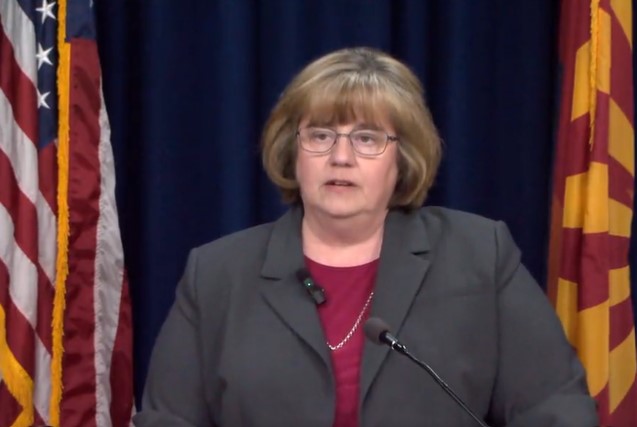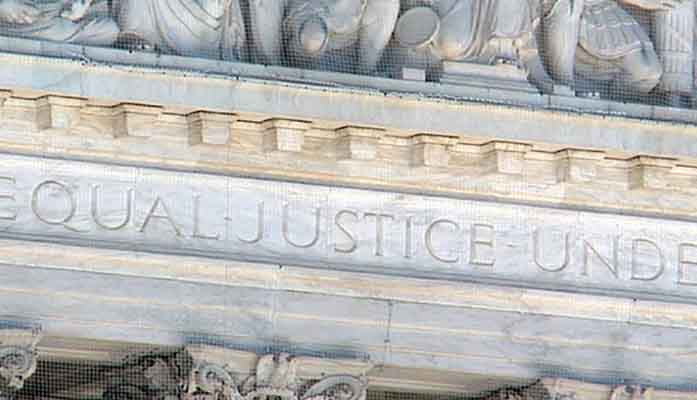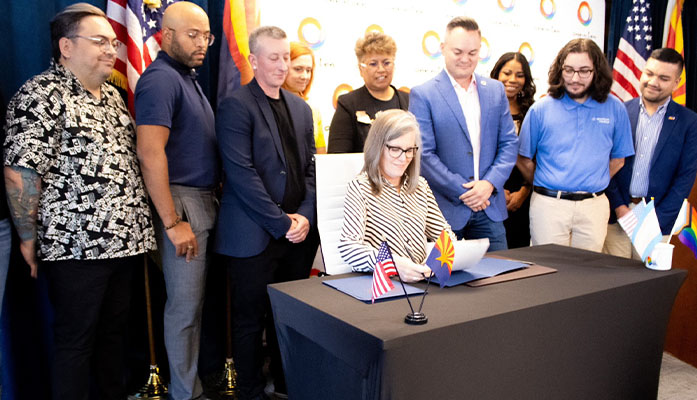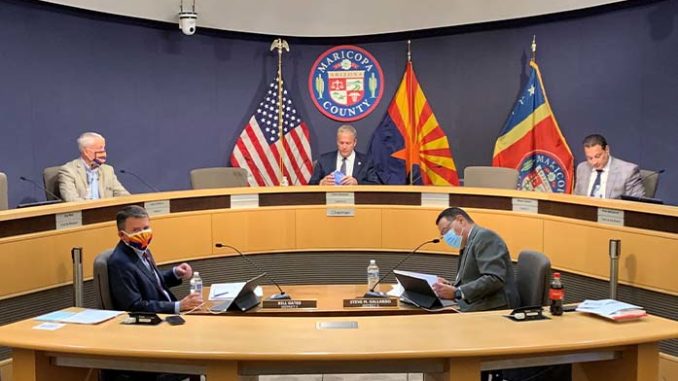
by Daniel Stefanski | Jun 30, 2023 | News
By Daniel Stefanski |
Arizona elected officials continue to react to Democrat Governor Katie Hobbs’ recent Executive Orders.
Earlier this week, Governor Hobbs signed two Executive Orders to “restore rights and protect LGBTQ+ Arizonans.” According to Hobbs’ Office, the Orders “ensure the state employee health care plan covers medically-necessary gender-affirming surgery” and bar “state agencies from funding, promoting, or supporting conversion therapy against LGBTQ+ Arizonans.”
Hobbs’ most-recent Executive Orders came just days after she signed another Order that would “centralize all abortion-related prosecutions under the Attorney General to ensure differences in applications of the law by county attorneys do not restrict access to legal abortions.”
On Wednesday, Senate President Pro Tempore T.J. Shope issued the following statement regarding the governor’s latest Orders: “Instead of helping families struggling to keep a roof over their heads, fill their tanks with gas and put food on the table, Governor Hobbs is making sure taxpayer dollars are instead going towards elective, sex change surgeries. The Governor continues to show just how tone deaf and out of touch she is with the majority of hard-working Arizonans. Director nominations hearings were suspended on Monday, and yet the Governor is already doubling down with another unilateral overreach. The Arizona Senate Majority Caucus is committed to checks and balances and will be reviewing all legal options to ensure appropriate constitutional separation of powers.”
Representative John Gillette took to Twitter to pose several questions to the state’s chief executive, writing, “Hobbs Signs EO to Allow State Employees to Have Sex Change procedures paid by State Health Insurance. 1. What happens to premiums? 2. Was the contract renegotiated? 3. What other elected surgery will get covered? Will BC/BS just cancel the contract as terms changed?
Maricopa County Attorney Rachel Mitchell also responded to the governor’s order on abortion prosecutions, saying, “Our current governor took an entire category of potential offenses and is attempting to prevent locally elected county attorneys from reviewing and making charging decisions on those matters. But what happens next? What happens in three-and-a-half years? What happens when another person occupies the governor’s seat and attempts this kind of power grab? What other set of offenses might a governor in the future not like and remove from local prosecutors?”
Daniel Stefanski is a reporter for AZ Free News. You can send him news tips using this link.

by Corinne Murdock | Jun 30, 2023 | News
By Corinne Murdock |
The city of Phoenix is being sued over its capitalization of a loophole to shield high-rise luxury apartments from up to an estimated $7 million in property taxes.
The city of Phoenix effectively agreed to relieve private real estate developer Hubbard Street Group of around $7 million in property taxes by taking ownership of their property, “Skye on 6th,” and declaring it part of a slum or blighted area while the developer continues to operate and manage the property. In return, the developer agreed to pay a total of $525,000 in rent to the city, pay $32,000 to two school districts, and dedicate 10 percent of its residential units to workforce housing for the eight years of the lease. The city arranged this deal through the state’s statutory provisions outlining the Government Property Lease Excise Tax (GPLET).
In the case Paulin v. City of Phoenix, two taxpayers represented by the Goldwater Institute sued the city over allegedly violating the Arizona Constitution’s Gift Clause and Evasion Clause.
Since local governments are exempt from property taxes, GPLET enables governments to accrue revenue on its property by leasing to businesses. The Goldwater Institute, on behalf of the two Phoenix taxpayers, argues that the city took advantage of GPLET by assuming ownership of the property of interest to a private business in order to provide a special tax break to that business. Although the government sustains a reduced revenue stream and taxpayers pay more under such an arrangement, the Goldwater Institute alleges that local politicians may claim business growth while paying off the business with a tax write-off.
“[U]nder this arrangement, private property is conveyed in form to the government while in substance being owned and operated by a private party for the sole purpose of evading property taxes to which other taxpayers are subject,” stated the complaint. “The result of this arrangement is a gift of public resources to a private business, and a conveyance of property to evade taxes in violation of Arizona’s Constitution.”
Those poised to lose out on their share of the $7 million in tax payments would include the city, Maricopa County, Maricopa County Community College District, Central Arizona Project, Maricopa Special Healthcare District, Fire District Assistance Tax, and special taxing districts for library and flood control. Phoenix Elementary School District and Phoenix Union High School District are the two school districts receiving the tens of thousands to reportedly offset their share of the lost tax revenue.
The Goldwater Institute also disputed the city’s characterization of the contested property as located in a slum or blighted area: a condition required for an eight-year tax abatement as provided in the GPLET agreement between Phoenix and the developer.
A hearing on the case took place last week in the Maricopa County Superior Court. The city argued that taxpayers upset by their arrangement with the developer were truly upset with the existence of GPLET. The city contended that the taxpayers should petition lawmakers to reform GPLET law to prevent their actions.
Counsel for the city also contended that any claims that their actions violated the Gift Clause would render GPLET impossible to use.
The city also claimed that Hubbard Street Group was chosen through the request-for-proposal (RFP) process, and disputed the claim that Hubbard Street Group approached the city first.
The Goldwater Institute argued that there were no actual reservations of ownership, control, or management of the property. They also argued that the city never intended to hold onto the property itself, but always intended to convey the property back to the lessee. Counsel for the developer contended that claim, referencing a contract provision that the property will be owned by the city.
In a statement, Goldwater Vice President for Litigation Jon Riches said that Phoenix’s use of GPLET is unconstitutional.
“The Arizona Constitution prohibits the transfer of property to evade taxes that are otherwise owed and that other taxpayers must pay,” said Riches. “Here, the city of Phoenix allowed private property to be transferred to the city even though it will never be used as city property so that one special interest could avoid paying taxes on it. We are hopeful the court will agree this artificial transfer violates the Constitution.”
In 2020, the Maricopa County Superior Court struck down a similar GPLET arrangement between the city of Phoenix and another high-rise residential developer. Four months later, the city entered into the currently-contested GPLET agreement with Hubbard Street Group.
A ruling on the case may occur sometime within the next several months.
Corinne Murdock is a reporter for AZ Free News. Follow her latest on Twitter, or email tips to corinne@azfreenews.com.

by Daniel Stefanski | Jun 29, 2023 | News
By Daniel Stefanski |
Arizona’s Legislature is about to have a new member within its ranks.
This week, Arizona Republican Party Chairman Jeff DeWit sent a letter to the Maricopa County Board of Supervisors, informing them that “on Monday, June 26, 2023, the elected Precinct Committeemen of Legislative District 2 convened a meeting to nominate three qualified electors to fill a vacancy in the legislature.”
DeWit revealed that the nominees were Shawnna Bolick, Josh Barnett, and Paul Carver.
Carver, the chairman of the Legislative District 2 Republicans, posted on his Facebook account that he is “honored to be among those chosen,” adding that “the meeting ran smooth and our LD did not disappoint with the Nominees. We are blessed in our LD to have so many amazing Patriots.”
Bolick, who served in the Arizona House before an unsuccessful run for the Republican nomination for Secretary of State in 2022, thanked the precinct committeemen who nominated her as one of the individuals for this vacancy, writing, “I honorably served my constituents at the Capitol for four years. I know what it takes to win. I am the only candidate who can hit the ground running on day one. While I was at the Capitol, I led the charge in so many policy areas with many of my bills earning bipartisan support and becoming law making me the best nominee to effectively represent LD2. I look forward to meeting with the Board of Supervisors to discuss with them why I would be the best replacement to represent Legislative District 2.”
Before he earned a coveted nomination, Barnett, who had previously run for U.S. Congress in the 2022 Republican Primary, tweeted, “I’m the one that can win in 2024 and defeat Judy Schweibert. I have the knowledge, wherewithal, & grit to get things done for the People. Some have already lost to Schweibert in past races and some have no real understanding of our 51 Constitutions. I am asking for your vote tonight to let me show you what can happen when someone is actually standing up against corruption and unapologetically using the Constitution to its fullest extent to our advantage.”
The legislative vacancy came about due to the sudden resignation of former Senator Steve Kaiser, who announced his plans to step down from his seat earlier this month. Kaiser’s resignation was official on June 22, giving Republican precinct committeemen in Arizona Legislative District 2 the opportunity to handpick nominees for consideration by the Maricopa County Board of Supervisors.
Legislative District 2 is expected to be very competitive in November 2024, and at least one Democrat is already eyeing the Senate seat in the next General Election. Representative Judy Schwiebert wasted little time in staking a claim to a run for the Arizona Senate, tweeting on June 16 that she would be throwing her name into the Democrat primary for this district.
The Arizona Republican Party’s Chairman thanked Carver and the precinct committeemen “for their professionalism, hard work, and dedication to ensuring a smooth, fair, and transparent process.” DeWit stated that “we anticipate a prompt appointment by the Maricopa County Board of Supervisors so that the work of the Legislature can continue.”
The Maricopa County Board of Supervisors’ role in selecting replacements for legislative vacancies has been a point of contention between them and some Republicans in the state legislature. Earlier this year, Senator J.D. Mesnard took to the floor of his chamber to address the Maricopa County Supervisors’ ongoing consideration of two legislative vacancies in both the House and the Senate. Mesnard’s frustrations boiled over on the Senate floor as he laid out his charge against the Supervisors’ alleged delay in filling the two vacancies for 19 (Senate vacancy) and 20 (House vacancy) days. He informed his colleagues that “the length of these vacancies is the longest, while we’ve been in session, in half a century – 56 years!” The East Valley lawmaker also said that 8.76 days is the historical average to fill the vacancy.
Senator Mesnard hinted that maybe his colleagues should take future action to change the statute to force the county board of supervisors to act with more urgency when filling vacancies during a legislative session.
The hint of legislation from Mesnard may be a reality in short order. On June 25, Arizona Senator Justine Wadsack tweeted, “I plan to introduce legislation that removes the power of the County BOS from choosing people to replace legislators who are Expelled or Resign. We must put the power in the hands of the PCs, who’s authority currently ends at presenting (3) candidates for the BOS to choose from.”
Freshman Representative Austin Smith suggested that this proposal could be presented to Arizona voters as a constitutional amendment – especially due to a Democrat governor who could be hostile to this idea from Republican legislators.
Daniel Stefanski is a reporter for AZ Free News. You can send him news tips using this link.

by Corinne Murdock | Jun 29, 2023 | News
By Corinne Murdock |
Republican attorney general challenger Abe Hamadeh has yet to receive a ruling, a month after Mohave County Superior Court Judge Lee Jantzen promised one. The delay aligns with the judge’s history of tardiness on issuing rulings.
Hamadeh argued for a new trial in mid-May. At the time, Jantzen said he had a specific date in mind to issue a ruling, which he didn’t disclose, but promised to issue a ruling in several weeks’ time. That would’ve meant a ruling at some point near the end of May, possibly early June. It’s nearly July now.
Jantzen has been disciplined twice for failing to issue rulings on time.
In 2018, Jantzen was censured for violating the Code of Judicial Conduct, after failing to rule on an individual’s petition for post-conviction relief for over two years. Over those two years, Jantzen falsely certified on multiple payroll statements that he had no matters under submission that were pending and undetermined for over 60 days.
At some point prior to that punishment, Jantzen received a warning from the Commission on Judicial Conduct for similar misconduct involving a delayed ruling.
In 2021, Jantzen was again publicly reprimanded for failing to issue a ruling within 30 days as promised. He ended up issuing the ruling after 79 days. During that time, Jantzen again signed a payroll certification falsely claiming that he had no tardy matters under submission pending and undetermined.
Hamadeh trails Attorney General Kris Mayes by 280 votes: a fraction of the original 511 vote lead Mayes had prior to the recount. During oral arguments for a new trial in May, Hamadeh argued for the favorable existence of hundreds of “lost” uncounted votes — or, undervotes — and provisional ballots.
There were over 9,000 provisional votes that weren’t included in the final count. About 70 percent of Election Day voters were in favor of Hamadeh. Based on that scale, Hamadeh could have more than enough votes to surpass Mayes.
Provisional vote totals took as long as they did to discover due to a delay in response from the counties, according to Hamadeh. The disjunctive information flow between the government and the public is one of the warranting factors for a new trial, per Hamadeh.
“We have to get information from 15 different government agencies, and it’s complicated,” said Hamadeh. “I wish we had access to the information that the government has. That’s why we’re asking for a new trial.”
During the oral arguments, Mayes’ team focused on the amount of time that has passed since last fall’s election and her swearing in. Hamadeh has dismissed that claim. He argues that the Arizona Constitution’s absolute statement that the candidate with the most votes wins the election trumps any statutory timelines set by legislatures.
Of note, Mayes’ counsel never staked the claim that Mayes obtained the most votes. Conversely, Hamadeh’s team took every opportunity to present samples of evidence of uncounted, existing votes. The merits of these claims went uncontested by Mayes’ team.
Corinne Murdock is a reporter for AZ Free News. Follow her latest on Twitter, or email tips to corinne@azfreenews.com.

by Daniel Stefanski | Jun 28, 2023 | News
By Daniel Stefanski |
Unwilling to work with the Arizona State Legislature, Governor Katie Hobbs has again chosen to exercise unilateral power in the pursuit of her progressive plans.
On Tuesday, Governor Katie Hobbs announced that she signed two Executive Orders to “restore rights and protect LGBTQ+ Arizonans.” According to Hobbs’ Office, the Orders “ensure the state employee health care plan covers medically-necessary gender-affirming surgery” and bar “state agencies from funding, promoting, or supporting conversion therapy against LGBTQ+ Arizonans.”
In a press release, the governor said, “Our LGBTQ+ community should never have to face hate and discrimination, and I will do everything in my power to fight for full equality. The State is leading by example on this issue, and we will continue working until Arizona is a place where every individual can participate equally in our economy and our workforce without fear of discrimination or exclusion.”
Legislative Republicans, already working through their options for addressing Hobbs’ recent Executive Order on abortion, were quick to react. Arizona Senate President Warren Petersen did not mince his words in response to the state’s chief executive’s latest action, tweeting, “Instead of helping struggling AZ families plagued by inflation, the governor just issued an order for taxpayers to cover the cost of elective, sex reassignment surgeries. This illegal, out of touch, unprecedented overreach did not receive proper JLBC review as required by law.”
The Arizona Senate Republicans Caucus echoed its leader, writing, “Hobbs continues to show just how tone deaf she is with the majority of hard-working Arizonans. Her weak leadership abilities are on full display with every executive order and ignorant veto she drops.”
The Center for Arizona Policy immediately issued a statement to call Hobbs’ action a “dangerous power grab,” stating, “Governor Katie Hobbs should have run for the Arizona Legislature if she wanted to make law. Arizona lawmakers who represent Arizonans throughout the state are tasked with passing new laws, not the Governor. This power grab is not only partisan, but it is unwise and dangerous. What she calls “conversion therapy” amounts to basic counseling for those struggling with their gender. It is likely unconstitutional to tell therapists what they can say and citizens what therapy they can seek. It is also unconscionable to block coverage for counseling and health services sought by state employees and their dependents.”
The pro-life, pro-family organization added, “Hobbs also appears to be encouraging irreversible and experimental sex-change surgeries and drug therapies at a time when European countries are increasingly pulling back because of the damage done to so many. We also continue to see more and more people detransition after regretting the permanent effects of such drug therapies and surgeries.”
Many Democrats around the state cheered on the governor’s move, including Representative Nancy Gutierrez, who tweeted, “I was happy to be there today and witness these Executive Orders by Governor Hobbs! Our community will get the care they desire and be able to use their health insurance. I’m also grateful that no other child will subjected to harmful conversion therapy.”
Arizona Republicans now find themselves facing a Democrat governor who is growing increasingly bolder about pushing the bounds of her constitutionally stipulated authority. Just two months ago, Hobbs went through what some might consider as the lowest moments of her fledgling administration, vetoing a wildly popular (and overwhelmingly) bipartisan “Tamale Bill,” signing a state budget that allowed Republicans to protect key priorities (such as the ESA program), and losing her chief of staff.
However, the events of the past calendar week have seemed to buoy the governor’s previously diminishing political capital, starting with her Executive Order to “centralize all abortion-related prosecutions under the Attorney General.” On Monday, after taking the weekend to contemplate a plan of response, Senator Jake Hoffman, the Chairman of the Committee on Director Nominations, announced that he was cancelling Tuesday’s hearing and requested a meeting with the Hobbs’ administration “to discuss any additional overreach (her) office intends to take requiring complicity from Executive Directors.”
After a report circulated that this meeting was “not likely” to occur, Senator T.J. Shope tweeted, “Oh…so much for that Open Door Policy we’ve heard about over and over again. I guess Governor Hobbs would rather fight it out in an adversarial court setting as opposed to an adult conversation in an office setting.”
Not to be forgotten – legislative Republicans and Governor Hobbs recently were battling over a Prop 400 solution – a fight that has been pushed to the rear-view mirror with her calculated Executive Orders at the end of this month.
Daniel Stefanski is a reporter for AZ Free News. You can send him news tips using this link.

by Daniel Stefanski | Jun 28, 2023 | News
By Daniel Stefanski |
There might not be much runway left on this legislative session for Arizona legislators, but some legislators are already planning the introduction of a bill that could be introduced next year.
Arizona Senator Justine Wadsack tweeted Sunday, “I plan to introduce legislation that removes the power of the County BOS from choosing people to replace legislators who are Expelled or Resign. We must put the power in the hands of the PCs, who’s authority currently ends at presenting (3) candidates for the BOS to choose from.”
Wadsack explained her reasoning with a follow-up post, writing, “The Precinct Committeemen (PC) know who they want. Each PC represents their precincts & therefore know what THE PEOPLE want. The County BOS knows who to appoint based on what the political machine wants. It’s time to change the process to fit the needs of the people.”
The Senator received support for this bill from one of her colleagues in the House of Representatives, Austin Smith, who tweeted, “The opponents of something like this are TOTALLY ok with politicians having the final say picking their representatives and senators. Where are the champions of Democracy now?
When cautioned against proceeding with this idea with a Democrat governor, Smith responded, “Likely won’t need to the governor, may need to send this to the ballot as a constitutional amendment.”
The issue of selecting replacements at the Legislature during session became inflamed last month when Senator J.D. Mesnard took to the floor of his chamber to address the Maricopa County Supervisors’ ongoing consideration of two legislative vacancies in both the House and the Senate. Mesnard’s frustrations boiled over on the Senate floor as he laid out his charge against the Supervisors’ alleged delay in filling the two vacancies for 19 (Senate vacancy) and 20 (House vacancy) days. He informed his colleagues that “the length of these vacancies is the longest, while we’ve been in session, in half a century – 56 years!” The East Valley lawmaker also said that 8.76 days is the historical average to fill the vacancy.
Senator Mesnard spoke on behalf of the 120 Republican precinct committeemen who rearranged their schedule back in April to nominate the three individuals to fill the open House seat. He bemoaned the fact that such a lengthy delay was not previously an issue, and he hinted that maybe his colleagues should take future action to change the statute to force the county board of supervisors to act with more urgency when filling vacancies during a legislative session. He stated that the “Board of Supervisors should have held a special meeting to hasten what should be an important priority for them.”
Both of the vacancies for the Legislature were filled by the Maricopa County Supervisors soon after Mesnard’s address on the Senate floor. However, that didn’t stop Republican legislators from plotting a change in the law on this front.
Daniel Stefanski is a reporter for AZ Free News. You can send him news tips using this link.






